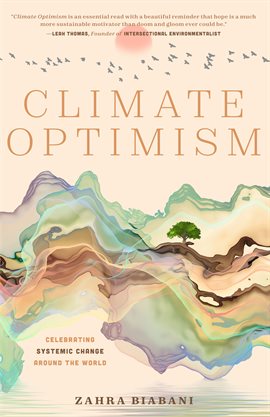Some people make New Year’s resolutions, but maybe spring is a better time to plant the seeds of hope for the coming year.
“Just as you sow seeds that you hope to tend into strong, healthy plants, you can also set personal intentions … A season of birth and renewal, spring is an especially potent time to state your hopes and dreams, calling them forth,” Fiona Cook and Jessica Roux profess in their book “The Wheel of the Year: An Illustrated Guide to Nature’s Rhythms.” While Cook and Roux’s book is written for a juvenile audience, anyone can enjoy the beautiful illustrations and the message about noticing and celebrating the Earth’s seasons.
In recognition of Earth Day, consider tapping into the energy of spring to find hope and inspiration for what the future could hold.
Author and activist Zahra Biabani makes compelling arguments for a hope-based approach in “Climate Optimism: Celebrating Systemic Change Around the World.” Her writing, grounded in sociological research, explains how biases can blind us to some problems but also make things seem worse than they are. Despair, Biabani argues, does not motivate people toward productive action. Our psychology requires the high octane fuel of hope. After making a pitch for hope in activism, Biabani lists positive actions in recent history and recommends paths forward.
Rutger Bregman’s book, “Humankind: A Hopeful History,” seeks to restore our hope in people. Western thought teaches that humans are by nature selfish and governed by self-interest. In an engaging narrative style, Bregman provides fascinating historical and scientific evidence of the inherent goodness of humans. According to Bregman, our collaborative, community-minded, kind and trusting natures are not only what make us human, but also what have made our species so successful.
For more evidence of human kindness in tasty, bite-sized pieces, pick up “Upworthy Good People: Stories From the Best of Humanity,” by Gabriel Reilich and Lucia Knell. In a mixture of short essays and even shorter blurbs, Knell and Reilich share hundreds of uplifting stories to restore your faith in humanity.
Anything by poet Ross Gay will brighten your day and give you a lyrical dose of hope, starting with “Catalog of Unabashed Gratitude,” and most recently, “The Book of (More) Delights.” Catalogued as poetry, Gay’s work is mostly prose, very accessible and (as promised) delightful.
Once you’ve stoked your hope, use it to grow the future you want.
In “Hope in the Dark: Untold Histories, Wild Possibilities,” Rebecca Solnit revisits the vital role hope has played in past examples of progress. But hope isn’t a promise, Solnit cautions, it’s a possibility. Hope doesn’t ignore injustice; it witnesses injustice and looks for solutions. She writes, “Hope is an ax you break down doors with in an emergency; because hope should shove you out the door.”
Which solutions you fight for is up to you, but here are a couple of Earth-centric sources of inspiration to consider.
In “Saving Us: A Climate Scientist’s Case for Hope and Healing in a Divided World,” Katharine Hayhoe says that one of the most important things we can do to protect our climate and ourselves is talking about the issue with other people. If that sounds daunting, Hayhoe is here to help with explicit directions on how to have productive conversations, find common ground and cross divides. Her writing and ideas are grounded in research, practical, engaging and very readable.
If you have a yard, spring is an auspicious time to work on providing habitat for native wildlife. “Saving Nature One Yard at a Time,” by David Deardorff and Kathryn Wadsworth goes beyond instructions by sharing life stories of the creatures that share our landscapes. The result is a fascinating narrative that will help you appreciate the drama unfolding outside your front door as your new landscape develops.
And, finally, to sustain you, in what might be a long journey, take a look at “How to Live in a Chaotic Climate: 10 Steps to Reconnect With Ourselves, Our Communities and Our Planet,” by LaUra Schmidt.
A longer list of recommendations can be found here.



